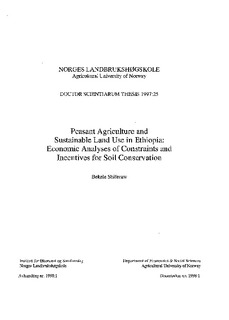| dc.description.abstract | In agriculture-based poor economies, degradation of agricultural land poses a serious threat to current and future food production potential. Ethiopia is one of the poorest countries in Africa that is heavily dependent on peasant agriculture and is affected by extensive degradation of agricultural lands. Per capita food production has severely lagged behind rates of population growth, and food shortage has become a chronic problem in the country. Coupled with the poor performance of the agricultural sector, massive poverty of the rural population, high population growth, land scarcity, technological stagnation, social conflicts, misguided policies and deficient institutional structure hinder sustainable utilization of agricultural lands. The problem of degradation of agricultural land is most notable in the highlands where human and livestock pressure is highest. This study attempts to examine the factors that deter sustainable use of land resources by peasant households, and various economic and institutional incentives that can be employed to enhance conservation-based agricultural development. Theoretical and empirical analyses of farm households' decision behavior are used to examine the constraints and incentives for sustainable land-use. Results from a farm-level optimal control model show that rural market imperfections, policy failures, and poverty may lead to disparities in the value of farmland to society and the private user even when external effects (off-site costs) are negligible. The peasant's decision to conserve or degrade land is also influenced by productivity impacts of conservation technologies, input and output prices, the discount rate, the quality of the soil, and future productivity impacts of current soil erosion. | nb_NO |

